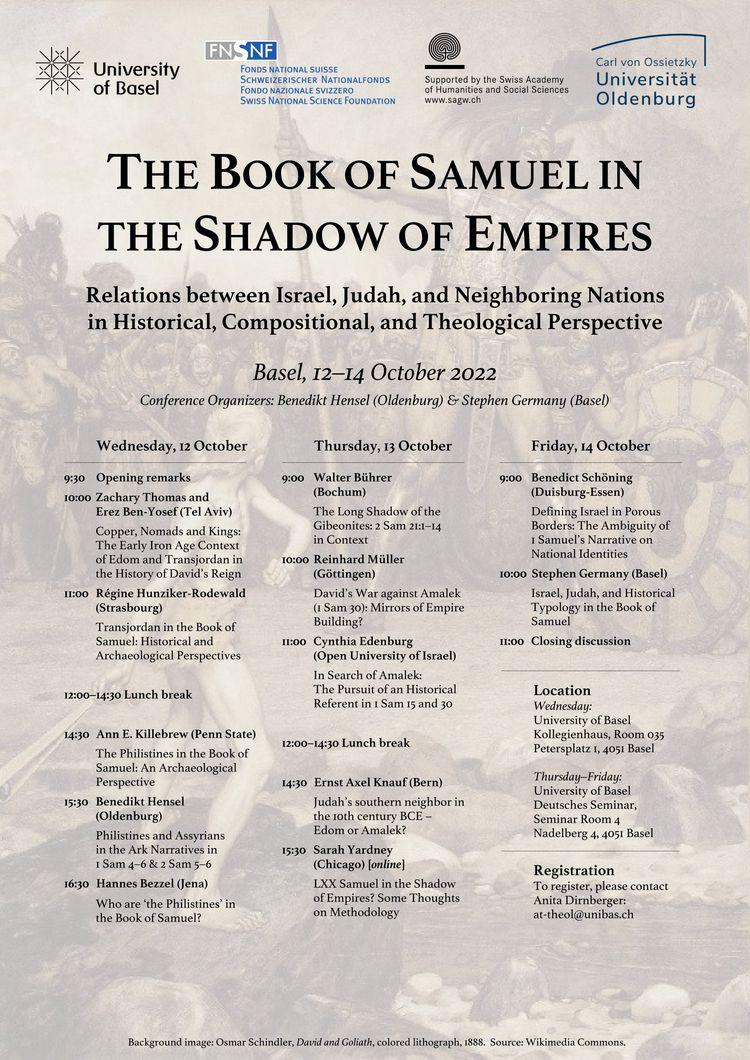International Conference
International Conference
The Book of Samuel in the Shadow of Empires.
Relations between Israel, Judah, and Neighboring Nations in Historical, Compositional, and Theological Perspective
12.-14. Oktober 2022
Organisation
Prof. Dr. Benedikt Hensel (Oldenburg)
Dr. Stephen Germany (Basel)
Veranstaltungsankündigung (for english version see below)
Prof. Dr. Benedikt Hensel (Carl von Ossietzky Universität Oldenburg) und Dr. Stephen Germany (Universität Basel) richten an der Universität Basel vom 12.-14. Oktober 2022 eine internationale Konferenz unter dem Titel „The Book of Samuel in the Shadow of Empires. Relations between Israel, Judah, and Neighboring Nations in Historical, Compositional, and Theological Perspective” aus, zu der Interessierte herzlich eingeladen sind.
Ziel der Konferenz ist es, eine präzisierende Erfassung der Rolle der imperialen Großmächte wie auch der Anrainerstaaten und Nachbarkulturen Israels und Judas zu leisten. In den Samuelbüchern spielen die Nachbarvölker Israels und Judahs wie auch die in der Südlevante agierenden imperialen Großmächte des 1. Jahrtausends eine so entscheidende Rolle wie kaum in einem andere biblischen Literaturbereich, nämlich, erstens, für die Erzählwelt der Bücher, wie auch, zweitens, für die in Samuel reflektierten, aber wechselnden historischen Realitäten, und drittens für die literaturgeschichtliche und insbesondere redaktionsgeschichtliche Erforschung der Samuelbücher spielen.
Erforderlich, möglich und lohnend ist diese Fragestellung und Zielsetzung der Konferenz wegen der aktuellen und neuesten Entwicklungen der historischen Forschungen und literaturgeschichtlichen Debatten zu den Samuelbüchern und ihren weiteren Kontexten (Kön-Bücher; DtrG; Enneateuch). Die Beschreibung der Nationen und Großmächte, wie sie sich auf narrativer, textpragmatischer, literaturgeschichtlicher und historischer Ebene in den Samuelbüchern und deren Auslegung niederschlagen, hängt damit eng mit der präzisierenden Erfassung der Literaturgeschichte der Samuelbücher und seinen größeren literarischen Kontexten (Kön-Bücher, DtrG; Enneateuch) zusammen.
Der Vielschichtigkeit der Problemlage wird mit einem breiten multi- und cross-disziplinären Ansatz entsprochen, der Beiträge aus Archäologie, Geschichte, Literaturgeschichte und Narratologie mit einschließt.
Mit dem für diese Konferenz entscheidenden „Okular“ der Völker- und imperialen Geschichte leistet die Konferenz somit einen entscheidenden Beitrag zur die historische wie auch die literarturgeschichtliche Erschließung innerhalb der aktuellen Samuelforschung.
Die Tagung wird großzügig durch die Schweizerische Akademie der Geistes- und Sozialwissenschaften (SAGW) sowie durch den Schweizerischen Nationalfonds (SNF) gefördert.
Interessiert melden sich zur Anmeldung bitte an: Anita Dirnberger: at-theol@unibas.ch.
About the Conference
Israel’s and Judah’s relationship with other ancient Near Eastern nations is a theme that permeates the book of Samuel on multiple levels of interpretation. Within the narrative world of the book, the decisive cultural-political transition to kingship is closely tied up with Israel’s relations with neighboring peoples. The book recounts the story of the early monarchy through its main protagonists Samuel, Saul, and David and their contacts and conflicts with neighboring nations, such as the Philistines, Edomites, Arameans, Moabites, and Ammonites. Given this panoply of neighboring nations in the book of Samuel, it is all the more striking that not a word is said explicitly of the major ancient Near Eastern empires that presumably loomed in the background at the time when the book was written, namely, the Assyrians, Babylonians, and Persians. And yet, as recent research has shown, the composition and ideology of book of Samuel clearly bear the mark of Israel’s and Judah’s experiences under the latter empires.
Several questions thus arise: What narrative function do foreign nations and empires serve within the world of the text? What can be said about the nations and empires described in the text from the perspective of extrabiblical evidence, such as archaeology? To what extent does the text reflect the historical conditions of the period in which the narrative is set (i.e., the late Iron Age I) versus those of the later periods in which the book developed? What might the book of Samuel have to say about Israel’s and Judah’s experiences under the Assyrian, Babylonian, and Persian Empires and biblical scribes’ attitudes toward these empires or toward the concept of empire more broadly?
A closer look at the representation of neighboring nations as well as the theme of empire in the book of Samuel from multiple perspectives – archaeology, compositional development, and his-toriographical and theological function – serves as a gateway to understanding the historical back-ground and literary history of the book of Samuel more broadly. Here, it is crucial to maintain a clear distinction between these different levels of interpretation and methodological approaches (which have not always been adequately distinguished from each other in previous research) in order to reach a historically sound interpretation of the book.
This more nuanced approach to the discourse on foreign nations and empires in the book of Samuel stands at the center of the conference.
This interdisciplinary conference will place a special focus on integrating the results of ongoing archaeological excavations and international research projects relating to Israel’s neigh-bors (particularly the Philistines, Edomites, and Arameans) with current narratological and literary-historical analyses of the book of Samuel. The major methodological approaches are reflected in the three main sections of the conference: (1) The Nations and Empires of the Book of Samuel: Historical and Archaeological Perspectives; (2) Nations and Empires as a Catalyst in the Formation of the Book of Samuel; and (3) Nations, Empires, and the Construction of Israelite Identity in the Book of Samuel.
Publication of the Conference
The Book of Samuel in the Shadow of Empires: Relations between Israel, Judah, and Neighboring Nations in Historical, Compositional, and Theological Perspective (Series: Orientalische Religionen in der Antike / Research on Israel and Aram in Biblical Times), edited by Stephen Germany and Benedikt Hensel, Tübingen: Mohr Siebeck.



